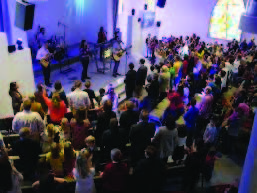

Source: SAT7-UK (https://www.sat7uk.org/beirut-church-shareslove- refugees-across-arab-world/)
Evangelical churches in Lebanon have undergone a resurgence as they have opened their doors to refugees from Syria, writes Scott Gustafson in the International Bulletin of Mission Studies (January). From 2011 to 2020, Syrian refugees, mainly Muslim, flooded into neighboring Lebanon to escape war and unrest in their country. By 2015, Lebanon had become the most densely populated country in the world in terms of refugees, with one in every four persons then in the country seeking refuge from the war—a reality that churches were not prepared for. Showing compassion to the refugees divided many churches, with some seeing their Muslim identity as a threat. Yet numerous mercy ministries were started, and evangelism and conversions have now become commonplace. By shifting their mission strategies and engaging in new partnerships with other churches and organizations, the churches have experienced “exponential growth,” Gustafson writes. One important cause of growth was the Lebanese Society for Educational and Social Development, a Baptistfounded group that helped create international partnerships between churches, foundations, and even government agencies to support relief efforts.
One prominent church drawing on these resources is Resurrection. Church in Beirut, which has grown from 70 attenders to 1,300 in a few years, and another hub of relief work and evangelism has been True Vine Church in the Beqaa Valley. There are reported to have been about 38,000 converts added to the churches in the last few years. Much of the growth has come through new home visitation programs the churches use in conjunction with Bible studies that are organized in residential areas. The Arab cultural trait of “thick hospitality” is one reason these home visits have been so effective, Gustafson writes. But he sees the overall change from a closed, defensive stance to a more open and “holistic,” outreach-oriented approach as the main reason for the churches’ success. Gustafson concludes, however, that the challenges are just starting for the churches; they have to develop educational programs for the new converts and prevent people from using their churches mainly for material needs and financial gain, as well as discouraging the congregations themselves from stressing numbers and fund-raising over long-term commitment. Lebanon’s evangelicals (Gustafson does not mention mainline Protestant, Catholic, and Maronite churches) now see themselves as part of a revival movement of Muslim conversion to Christianity that is also taking place in Iran and the broader region.
(International Bulletin of Mission Research, https://journals.sagepub.com/home/ibm)